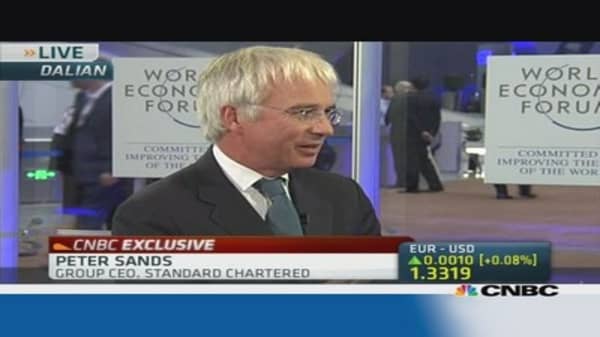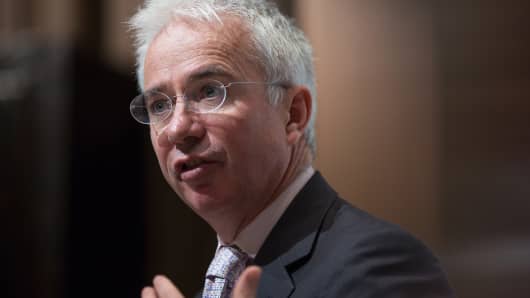A period of extraordinary central bank intervention is coming to an end and nobody is sure what the consequences will be, Peter Sands, Group CEO of Standard Chartered Bank told CNBC on Thursday.
"We don't know precisely how this is going to work and I don't think it's just an emerging market issue. It's an issue for the global economy as a whole," Sands said on the sidelines of the World Economic Forum in Dalian, China.
"The one thing I would say is that we should expect volatility. When you have that degree of intervention, stopping it is not going to be a smooth and simple process," he said.
(Read more: Worst case for Fed taper: mere market 'indigestion'?)
The comments come amid swelling speculation that the U.S. Federal Reserve could begin tapering its asset purchase program at next week's policy meeting.
Many analysts cite such speculation as the catalyst for the recent rout in emerging markets that has seen sharp currency declines and stock market volatility in countries from Brazil to India and Turkey.
However, as investors aim to gauge the potential impact of Fed tapering on the developing world, Sands cautioned against generalizing and over simplifying the mechanics of emerging markets.
"When people talk about emerging markets it's as if all the emerging markets respond to every shock the same way, and that simply isn't true," he said. "These generalizations can be a little unhelpful sometimes because they disguise very different things that are going on at very different places. "
(Read more: Albert Edwards: Emerging rout to trigger global recession)
Despite recent downgrades to gross domestic product (GDP) growth forecasts in the likes of India and Indonesia, Sands still sees "plenty of opportunities for growth" in emerging markets.
"Let's not say that emerging markets don't have challenges. It's just that the underlying demographic processes of organization and industrialization are still driving pretty impressive rates of GDP growth," he said.
Upbeat on China
Sands said he remains "very positive" about China, the world's second biggest economy, which appears to be picking-up after a slowdown earlier this year.
"You can't expect an economy of this scale to grow at such a pace without there being all sorts of stresses and strains within the economy. But the thing that I think is encouraging is the determination of the leadership to confront and talk about these issues and to take action against them," he said.
(Read more: Emerging market currency crash: Who's to blame?)
China has released a slew of encouraging economic data for August, including above-view industrial production and exports data that has led many banks and brokerages to raise their GDP growth forecasts for the mainland.
But Sands was less optimistic on India, Asia's third largest economy.
"The market as a whole faces significant challenges. Obviously we've got the prospects of an election next year and so we're quite cautious about it," he said.
—By CNBC.Com's John Phillips; Follow Him on Twitter @J_Phillips_CNBC




